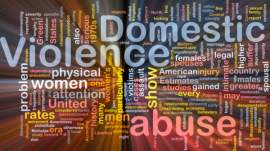
Call the Domestic Violence Hotline for help

What is Domestic Violence?
Domestic Violence refers to the victimization of an individual or individuals resulting from abuse, attacks, or assault undertaken by their respective partners within the realm of a romantic relationship or courtship.
Domestic violence is somewhat of a broad definition, for it can include multiple acts, delivered in a variety of fashions; domestic violence can be inflicted on the victimized party in a sexual, physical, emotional, verbal, psychological or economic nature. Regardless of the form; however, all acts of domestic violence are debilitating and harmful to the sanctity of the relationship and to the health of the aggrieved party.
Although the typical notion attached to domestic violence places the male in the aggressive role and the woman in the victimized role, acts of domestic violence, in all fashions, can be administered between both genders.
What is a Domestic Violence Hotline?
The Domestic Violence Hotline is a national resource used to not only educate victims of domestic violence, but to act as the intermediary between the aggrieved party and coordinating law enforcement officers.
The Domestic Violence hotline can be accessed via the Internet at http://www.thehotline.org/ or via telephone at 1-800-799-SAFE(7233). The Domestic Violence Hotline offers an anonymous report feature, which enables a victim or a friend of victim to report an incident without giving their legal name.
In addition to informing the authorities, the domestic violence hotline offers victims numerous resources to help them understand their particular situation. Often times when an individual is placed in a violent situation, they lose sight of reality and fail to make logical decisions. The domestic violence hotline and other similar resources throughout the country offer these individuals various readings, resources and professionals to talk to.
Reporting an instance of domestic abuse is crucial to the health of the victim; this action becomes even more crucial if the victim has children. The presence of children in an abusive relationship can be crippling to the youth’s future. As a result of these long-term deficiencies, it is imperative to contact the domestic violence hotline if you or a loved fall victim to an abusive partner.
Why are victims reticent in regards to contacting a Domestic Violence Hotline?
Unfortunately acts of domestic violence are somewhat common throughout the world. That being said, the majority of domestic violence cases go unreported; the unwillingness to report a domestic violence case exists for a multitude of reasons, none of which are healthy or rational.
The security and sense of comfort a relationship offers, in some unfortunate situations, supersedes the damage inflicted by domestic violence. Victims may not report acts to a domestic violence hotline because they may feel the relationship is still salvageable or they are afraid losing the emotional and financial security their partner offers.
Additionally, victims of domestic violence will feel they will only create more problems if they contact a domestic violence hotline; fear and intimidation is typically at the root of such cases, often times victims will feel that their partner will come after them in a fit of rage if they report the incidence. And lastly, many victims fail to contact a domestic violence hotline because they are psychologically damaged and have been belittled to the point where they no longer have any confidence or self-respect—they simply accept the role of the victim.
NEXT: Your Guide to Reporting Abuse





















